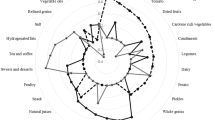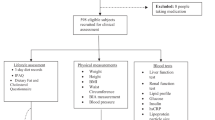Abstract
Background/Objectives:
Nutritional epidemiology shifted its focus from effects of single foods/nutrients toward the overall diet. Food-based dietary guidelines (FBDGs) are promoted worldwide to stimulate a healthy diet, including a variety of foods, to meet nutrient needs and to reduce the risk for non-communicable diseases. The objective of this study was to investigate whether adherence to the FBDG is associated with reduced femoral/carotid atherosclerosis and/or inflammation.
Subjects/Methods:
In October 2002, 2524 healthy men and women aged 35–55 years were recruited for the Belgian Asklepios cohort study. Subjects were extensively phenotyped, including echographic assessment of (carotid and femoral) atherosclerosis. A dietary index consisting of three subscores (dietary quality, diversity and equilibrium) was calculated to measure adherence to the Flemish FBDG, using data from a semi-quantitative food-frequency questionnaire. General linear models were used to investigate associations between these scores and cardiovascular (CV) risk factors and atherosclerosis and inflammation markers.
Results:
Women had better overall dietary scores than men (69 vs 59%). Participants with higher dietary scores showed better age-adjusted CV risk profiles (lower waist/hip ratio, blood pressure, non-high-density lipoprotein-cholesterol, blood triglycerides and homocystein), although most of these associations were only significant in men. Higher dietary scores were also inversely associated with inflammation makers (interleukin-6 and leukocyte count). Associations between diet and atherosclerosis were only found for femoral atherosclerosis and significance disappeared after adjustment for confounders.
Conclusions:
Better adherence to the Flemish FBDG is associated with a better CV risk profile and less inflammation, mainly among men. There was no direct effect on the presence of carotid or femoral atherosclerosis.
This is a preview of subscription content, access via your institution
Access options
Subscribe to this journal
Receive 12 print issues and online access
$259.00 per year
only $21.58 per issue
Buy this article
- Purchase on Springer Link
- Instant access to full article PDF
Prices may be subject to local taxes which are calculated during checkout
Similar content being viewed by others
References
Cade J, Thompson R, Burley V, Warm D (2002). Development, validation and utilisation of food-frequency questionnaires—a review. Public Health Nutr 5, 567–587.
Chrysohoou C, Panagiotakos DB, Pitsavos C, Das UN, Stefanadis C (2004). Adherence to the Mediterranean diet attenuates inflammation and coagulation process in healthy adults: the Attica study. J Am Coll Cardiol 44, 152–158.
Conroy RM, Pyorala K, Fitzgerald AP, Sans S, Menotti A, De BG et al. (2003). Estimation of ten-year risk of fatal cardiovascular disease in Europe: the SCORE project. Eur Heart J 24, 987–1003.
Davis N, Katz S, Wylie-Rosett J (2007). The effect of diet on endothelial function. Cardiol Rev 15, 62–66.
Esmaillzadeh A, Kimiagar M, Mehrabi Y, Azadbakht L, Hu FB, Willett WC (2007). Dietary patterns and markers of systemic inflammation among Iranian women. J Nutr 137, 992–998.
Esposito K, Marfella R, Ciotola M, Di Palo C, Giugliano F, Giugliano G et al. (2004). Effect of a Mediterranean-style diet on endothelial dysfunction and markers of vascular inflammation in the metabolic syndrome: a randomized trial. JAMA 292, 1440–1446.
Fogli-Cawley JJ, Dwyer JT, Saltzman E, McCullough ML, Troy LM, Jacques PF (2006). The 2005 Dietary Guidelines for Americans Adherence Index: development and application. J Nutr 136, 2908–2915.
Ford ES, Mokdad AH, Liu S (2005). Healthy eating index and C-reactive protein concentration: findings from the National Health and Nutrition Examination Survey III, 1988-1994. Eur J Clin Nutr 59, 278–283.
Fung TT, McCullough ML, Newby PK, Manson JE, Meigs JB, Rifai N et al. (2005). Diet-quality scores and plasma concentrations of markers of inflammation and endothelial dysfunction. Am J Clin Nutr 82, 163–173.
Fung TT, Rimm EB, Spiegelman D, Rifai N, Tofler GH, Willett WC et al. (2001b). Association between dietary patterns and plasma biomarkers of obesity and cardiovascular disease risk. Am J Clin Nutr 73, 61–67.
Fung TT, Willett WC, Stampfer MJ, Manson JE, Hu FB (2001a). Dietary patterns and the risk of coronary heart disease in women. Arch Intern Med 161, 1857–1862.
Hu FB, Rimm EB, Stampfer MJ, Ascherio A, Spiegelman D, Willett WC (2000). Prospective study of major dietary patterns and risk of coronary heart disease in men. Am J Clin Nutr 72, 912–921.
Hu FB, Willett WC (2002). Optimal diets for prevention of coronary heart disease. JAMA 288, 2569–2578.
Huybrechts I, Vereecken C, De Bacquer D, Vandevijvere S, Van Oyen H, Maes L et al. (2010). Reproducibility and validity of a diet quality index for children assessed using a FFQ. Br J Nutr 104, 135–144.
Kant AK, Schatzkin A, Graubard BI, Schairer C (2000). A prospective study of diet quality and mortality in women. JAMA 283, 2109–2115.
Kesse-Guyot E, Vergnaud AC, Fezeu L, Zureik M, Blacher J, Peneau S et al. (2010). Associations between dietary patterns and arterial stiffness, carotid artery intima-media thickness and atherosclerosis. Eur J Cardiovasc Prev Rehabil, (e-pub ahead of print 27 April 2010).
Liese AD, Nichols M, Hodo D, Mellen PB, Schulz M, Goff DC et al. (2010). Food intake patterns associated with carotid artery atherosclerosis in the Insulin Resistance Atherosclerosis Study. Br J Nutr 103, 1471–1479.
Lopez-Garcia E, Schulze MB, Fung TT, Meigs JB, Rifai N, Manson JE et al. (2004). Major dietary patterns are related to plasma concentrations of markers of inflammation and endothelial dysfunction. Am J Clin Nutr 80, 1029–1035.
McCullough ML, Feskanich D, Rimm EB, Giovannucci EL, Ascherio A, Variyam JN et al. (2000a). Adherence to the Dietary Guidelines for Americans and risk of major chronic disease in men. Am J Clin Nutr 72, 1223–1231.
McCullough ML, Feskanich D, Stampfer MJ, Giovannucci EL, Rimm EB, Hu FB et al. (2002). Diet quality and major chronic disease risk in men and women: moving toward improved dietary guidance. Am J Clin Nutr 76, 1261–1271.
McCullough ML, Feskanich D, Stampfer MJ, Rosner BA, Hu FB, Hunter DJ et al. (2000b). Adherence to the Dietary Guidelines for Americans and risk of major chronic disease in women. Am J Clin Nutr 72, 1214–1222.
Mikkilä V, Räsänen L, Laaksonen MM, Juonala M, Viikari J, Pietinen P et al. (2009). Long-term dietary patterns and carotid artery intima media thickness: the Cardiovascular Risk in Young Finns Study. Br J Nutr 102, 1507–1512.
Millen BE, Quatromoni PA, Nam BH, O’Horo CE, Polak JF, Wolf PA et al. (2004). Dietary patterns, smoking, and subclinical heart disease in women: opportunities for primary prevention from the Framingham Nutrition Studies. J Am Diet Assoc 104, 208–214.
Nettleton JA, Steffen LM, Mayer-Davis EJ, Jenny NS, Jiang R, Herrington DM et al. (2006). Dietary patterns are associated with biochemical markers of inflammation and endothelial activation in the Multi-Ethnic Study of Atherosclerosis (MESA). Am J Clin Nutr 83, 1369–1379.
Nettleton JA, Steffen LM, Schulze MB, Jenny NS, Barr RG, Bertoni AG et al. (2007). Associations between markers of subclinical atherosclerosis and dietary patterns derived by principal components analysis and reduced rank regression in the Multi-Ethnic Study of Atherosclerosis (MESA). Am J Clin Nutr 85, 1615–1625.
Panagiotakos DB, Pitsavos C, Stefanadis C (2006). Dietary patterns: a Mediterranean diet score and its relation to clinical and biological markers of cardiovascular disease risk. Nutr Metab Cardiovasc Dis 16, 559–568.
PASW. Predictive Analysis Software. 18th edn 2010: IBM SPSS Statistics: Chicago.
Pitsavos C, Panagiotakos DB, Tzima N, Chrysohoou C, Economou M, Zampelas A et al. (2005). Adherence to the Mediterranean diet is associated with total antioxidant capacity in healthy adults: the ATTICA study. Am J Clin Nutr 82, 694–699.
Rietzschel ER, De Buyzere ML, Bekaert S, Segers P, De Bacquer D, Cooman L et al. (2007). Rationale, design, methods and baseline characteristics of the Asklepios Study. Eur J Cardiovasc Prev Rehabil 14, 179–191.
Trichopoulou A, Costacou T, Bamia C, Trichopoulos D (2003). Adherence to a Mediterranean diet and survival in a Greek population. N Engl J Med 348, 2599–2608.
Willett WC (1998). Nutritional Epidemiology. Oxford University Press: New York, NY.
Acknowledgements
We want to acknowledge all the participants from the Asklepios Study who voluntarily contributed to this study. The Asklepios Study was partly funded by an FWO Research Grant FWO (G.0427.03).
Author information
Authors and Affiliations
Corresponding author
Ethics declarations
Competing interests
The authors have no conflict of interest.
Additional information
Contributors: LIH: statistical analyses, interpretation of the results and drafting of the paper. ERR: conceptualization of the study, statistical analyses, interpretation of the results and contribution to the writing of the paper. ML: laboratory investigations, and contribution to the writing of the paper. MDB: contribution to conceptualization of the study and to the writing of the paper. DDB: contribution to conceptualization of the study and to the writing of the paper. GDB: conceptualization of the study, and contribution to the writing of the paper. LM: concept of FBDGs and dietary quality index, interpretation of the results and contribution to the writing of the paper. TG: conceptualization of the study, interpretation of the results and contribution to the writing of the paper. IH: conceptualization of the dietary intake questionnaire, statistical analyses, interpretation of the results and contribution to the writing of the paper.
Rights and permissions
About this article
Cite this article
Hoebeeck, L., Rietzschel, E., Langlois, M. et al. The relationship between diet and subclinical atherosclerosis: results from the Asklepios Study. Eur J Clin Nutr 65, 606–613 (2011). https://doi.org/10.1038/ejcn.2010.286
Received:
Revised:
Accepted:
Published:
Issue Date:
DOI: https://doi.org/10.1038/ejcn.2010.286
Keywords
This article is cited by
-
Dietary diversity score and cardio-metabolic risk factors: an updated systematic review and meta-analysis
Eating and Weight Disorders - Studies on Anorexia, Bulimia and Obesity (2022)
-
Dietary patterns and associations with biomarkers of inflammation in adults: a systematic review of observational studies
Nutrition Journal (2021)
-
Vegetable diversity in relation with subclinical atherosclerosis and 15-year atherosclerotic vascular disease deaths in older adult women
European Journal of Nutrition (2020)
-
Diet as moderator in the association of adiposity with inflammatory biomarkers among adolescents in the HELENA study
European Journal of Nutrition (2019)
-
Diet as a moderator in the association of sedentary behaviors with inflammatory biomarkers among adolescents in the HELENA study
European Journal of Nutrition (2019)



